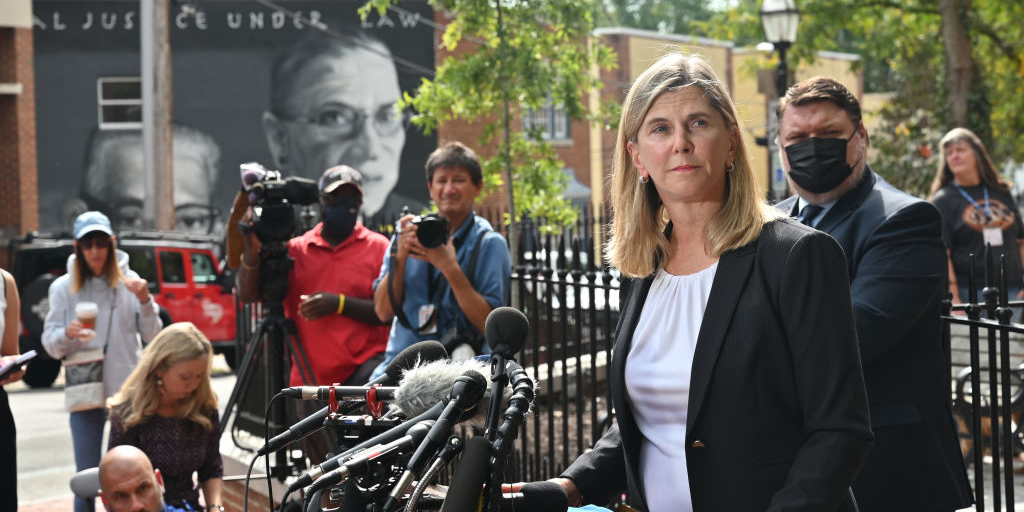
By Christianna McCausland
There is a scale model of the Capital Gazette newsroom in the office of Anne Arundel County State’s Attorney Anne Colt Leitess, J.D. ’88. It was made for her by the FBI during the sanity trial of Jarrod Ramos, the man convicted of murdering five staffers at the newspaper in 2019. Even now, more than a year after Ramos lost his Not Criminally Responsible (NCR) bid in July 2021, Leitess can lean over that model, about the size of a ping-pong table, and transport you into its scene.
She shows you where he entered, how he tactically blocked the exit Gazette employees could use to escape, where he stashed his belongings. Then she takes you step by step through his movements inside the office, as he gunned down five people before lying face-down on the floor to await the arrival of police.
Her retelling is so chilling it can raise the hair on your neck. This is her gift.
“In this job, juries can sense B.S.,” says David Putzi, a former prosecutor who worked with Leitess for four years before becoming a criminal defense attorney, now with the firm of Fisher & Putzi, P.A.
“When someone presents to a jury with sincerity—and you add a good hand of facts to that—it becomes an almost insurmountable thing for the defense. That’s how I find Anne. Juries appreciate how she comes at them, by being who she is.”
Steven Grossman, professor of law emeritus, taught Leitess at UBalt Law and coached her trial advocacy team. He’s followed her career ever since. “I could see right away that she had a real talent for being a trial attorney,” he recalls. “She knew how to tell a story, which is very important with a jury, and she could develop a rapport with the listener and present the case in a way the listener could understand.”
The Ramos case was right in Leitess’ wheelhouse. From the time she was 15 and took a field trip to a federal courthouse and saw trials in action, she knew she wanted to be a prosecutor. It’s part of the reason she chose UBalt Law: its close connection with local employers and reputation for helping students get jobs. Leitess was a law clerk in the Baltimore City State’s Attorney’s Office and got her first job there in 1988.
“I wanted to represent people in crisis, in peril,” says Leitess. “Homicide is my forte. I like homicide because the victims can’t speak for themselves. We’re working on behalf of the families.”
In 1990, Leitess became a prosecutor in Anne Arundel County. In 1998, she led the prosecution in the retrial of Scotland Williams for the murder of two attorneys in their Annapolis home. It was the first case to introduced mitochondrial DNA evidence in Maryland, which helped Leitess secure a conviction. She jokes that you know you’ve made it when the courtroom artist does your drawing. The Williams trial was the making of her.
In 2013 she became the interim state’s attorney when her boss retired. She lost in the election, so she went back to Baltimore, where she led a Special Victims Unit working on sexual assault and child homicide cases.
“I cried for every child,” she says. “What was always so shocking to me was the number of people who could have intervened but did nothing.
“The way I deal with that,” she continues, “is not letting any stone go unturned, and to make sure someone is held accountable.”
NO HIDDEN AGENDAS
Leitess has a reputation as a dogged prosecutor. Just speaking with her is an intense exercise. She talks quickly and steadily, with an air of unquestionable authority. One can only imagine what it would be like to be a defendant or jury in her laser-sharp sights.
Yet, despite her capacity to relentlessly pursue a case to the mat, she is also known for being selective in the cases she takes and giving people second chances.
“Anne is an extremely fair individual,” says Putzi. “When Anne believes a victim has been wronged, she’s extremely aggressive to right that wrong. Likewise, if she believes justice is better served with a case not being prosecuted, she will do that as well.
“She goes where the evidence leads here. She’s very forthright. There are no hidden agendas with Anne.”

Grossman says her balance has always impressed him.
“She could always distinguish between the serious cases and the cases in which you could give someone a break, when you didn’t want to make them a lifetime criminal,” says Grossman.
“People want the prosecutor’s office to be the bludgeon on their behalf,” says Leitess. “But we cannot blow with the prevailing winds. Prosecutors have to also look out for defendants’ rights. That’s where justice is served.”
The Ramos case was one she never thought she would have; it was going to be tried by the prior state’s attorney, as Leitess was in a bid for the elected office in 2018. Yet in 2019 she took ownership of the case. When she found out Ramos intended to plead insanity to get a lifetime sentence in a hospital, she was having none of it.
“There was absolutely no way I was going to allow Jarrod Ramos to make a farce of the legal system and be declared not criminally responsible,” she states.
A lesson Leitess learned working in the sex offense unit, which relies heavily on victim testimony, was to treat those cases like a homicide—you look for all the other evidence to help corroborate the crime. That’s what she did with the Ramos case.
“Not only do I prove my case, I try to disprove their case,” she states.
Enter the FBI model. And reams of evidence compiled by Leitess and her team that painted the portrait of a man who took meticulous care of his aging cat, got the oil changed in his car, and paid his rent on time. Even the fact that he put down his arms and waited in supplication for police—most mass shooters kill themselves or are shot by police—indicated a man who wanted a long, comfortable incarceration. In short, a sane man who did an insane thing. Which is exactly what the jury found in Leitess’ favor, and sentenced Ramos to five consecutive life terms.
After the trial, Leitess says she slept for 12 hours straight. She went to a legal conference the next weekend, which she found “relaxing.” She says people always ask what she’s going to do next, but the truth is she’s doing it now, and she was re-elected without opposition earlier this year.
“I hope to try one to two cases a year, especially cold cases,” she says. “I love this job.”
Christianna McCausland is a writer based in Baltimore.
